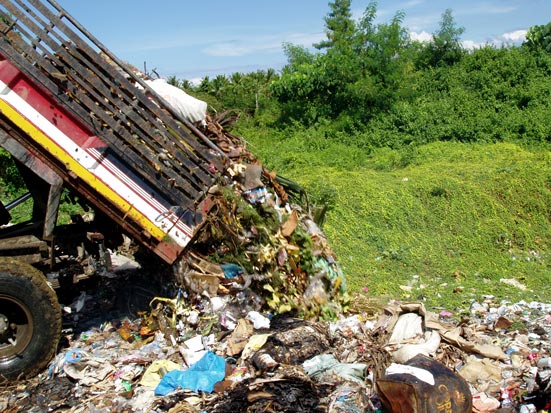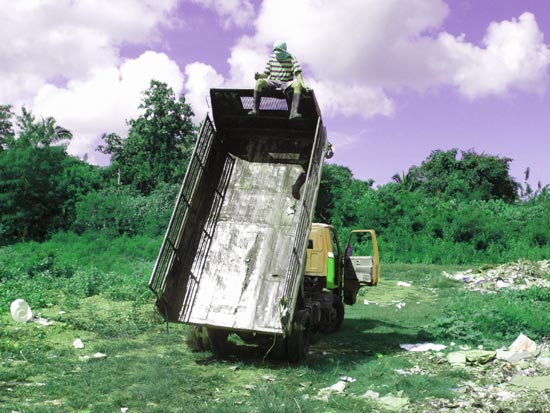November 18, 2004
Purple Haze.


I have approximately three major items on my agenda at the moment:
1. Help improve the municipal solid waste management system, and turn trash into cash and gardens.
2. Ensure an environmentally-friendly disposal system for chemical dye waste.
3. Get some of the local producer groups selling their goods to wholesale buyers online, in order to cut out the middle-man. (Plus, many international buyers who used to go to trade shows now do their buying online.)
Number one is already underway, number two will happen if and when the common dyeing center is build, and number three might happen when I learn how to explain the internet in the Cebuano language.
One might assume people would come running when you say "Hi, I'm here to help you with your trash. I will teach you how to throw as little waste as possible into bins that end up at the dumpsite, and compost as much as possible for use in your gardens. And I'll help you organize a program to sell your recyclables to junk buyers, and maybe sell some compost to farmers so they don't need to use as much chemical fertilizers to grow the food you eat and feed to your kids."
But people are busy and not ready to change their ways so fast when a foreigner shows up to try to tell them how it's done. And things seem to be going alright. After all, there are still fish in the sea (although there are many fewer than a few decades ago), the water is still drinkable (although probable contaminated), and the land is still producing fruits and vegetables. So why should they be more concerned about minimizing trash?
How about Malcolm Gladwell's ketchup bottle principle? You turn the ketchup bottle upside down and shake and shake and nothing happens. Then, suddenly, out comes three times as much ketchup as you can possibly handle on your fries. I might try carrying a ketchup bottle with me, but I'm not sure I can make the connection between ketchup and trash in Cebuano. Plus, ketchup ain't cheap, and fries cost a fortune. (By the way, ketchup here is usually banana-based. Don't worry, it's still red.)
A year or so ago, the municipality bought a piece of land, equidistant from the river and the sea. It's essentially just a hole in the ground, surrounded by plenty of beautiful trees.
The garbage truck (a small, smoke-belching diesel flatbed) drives around town, collecting everything from chopped banana trees to bags of coconut husks to plastic bags full of kitchen scraps. A good 70-80% is biodegradable. Probably 10-15% is recyclable. When the truck fills up, the truck drives to the dumpsite and dumps everything in the hole. The hole isn't that large, and at some point the hole will fill up. The question is how soon. Obviously, the more "waste" diverted, the better.
The sooner the hole fills up, the sooner the municipality will have to buy another piece of land for more trash, which will leave less money in the already tight budget for things like medical services and education. And that's not even getting into the slew of environmental problems a hole full of trash brings.
When I ask people where the garbage goes, they say "it goes on the truck." Out of sight, out of mind. I don't blame anyone for not knowing or caring where the trash ends up. After all, I have absolutely no idea where any trash I ever threw away in America ended up. (Although it was most likely sent to a landfill in a poor neighborhood.)
So anyway, I am thinking and thinking of ways to get the people here to care more about trash. I am just in the beginning stages and doing lots of reading and investigating. I think the local government, including the mayor, is interested in improving the situation. For one thing, Republic Act 9003, goes into law next year. President Gloria signed the act into law, requiring a certain percentage of trash to be diverted from dumpsites. But of course the government has a million other things to deal with, and the trash system seems to be working at the moment. Citizens aren't lining up to complain.
Yesterday, I visited the elementary school and asked the principal whether I could visit the classrooms and talk about trash. Without hesitation, she said "Absolutely. Thank you many much. If you start before Xmas you can bring all the kids (500) presents." So I've got an in there. (It turns out the principal's son lives in Stockton, California, the same city I lived in in 2003. They just started a municipal curbside composting program there!) The kids are the most important people to talk to anyway, cuz they are curious and they don't have hard-headed habits yet. Hopefully, if nothing else, they'll stop throwing their plastic ice water bags and snack wrappers on the ground.
Oh, the challenges that lie ahead.
Posted by dbs at November 18, 2004 10:07 PM